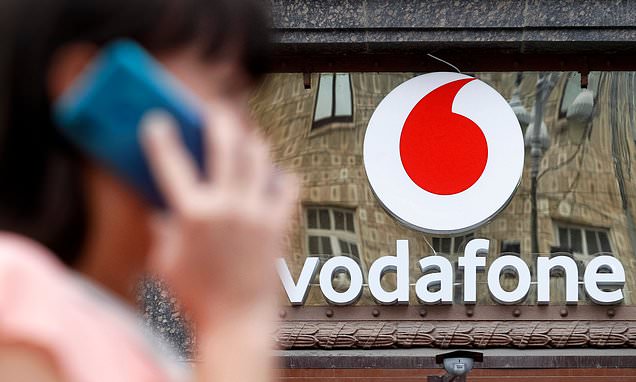
- Like-for-like group revenues rose 3.7%, but on a reported basis they fell by 4.8%
- In the UK, people tied to mobile contracts saw yearly prices go up by £2-£3
Vodafone revenues jumped in the last quarter on the back of price hikes, though this came at the cost of losing some cost-conscious customers.
The telecoms giant’s total revenues fell by 4.8 per cent to €10.7billion (£9.3billion) in the three months to the end of June, though on a comparable basis sales rose 3.7 per cent.
Strong performance in the UK, where it is merging with rival mobile network Three, helped offset declines in Germany, its largest market, as well as in Italy and Spain.
In Germany, sales slipped by 1.3 per cent, as it lost some 121,000 broadband customers after hiking prices.
However, higher prices introduced in May also helped limit the sales decline compared to the previous quarter, when sales had fallen by 2.8 per cent.
‘During Q1, we began the phased implementation of a broadband price increase across our customer base,’ Vodafone said.
‘This supported service revenues but impacted our commercial performance, as expected, with net cable customer disconnections of 70,000 and 51,000 DSL losses.’
Customers in the UK, however, were not forced to the exit by price increases introduced in April, with like-for-like sales jumping by 5.7 per cent to €1.4billion, (£1.2 billion).
The group added 42,000 broadband customers in the quarter, taking the existing total of customers to 1.3million.
However, it lost 66,000 mobile contract customers after the disconnection of zero-value SIMs provided to businesses during the pandemic.
Excluding these, Vodafone said its mobile contract customer base was ‘broadly stable, despite implementing annual contractual price increases’.
Vodafone said customers tied to mobile contracts saw yearly prices go up by between £2 and £3 on average, excluding vulnerable customers and those tied to social tariffs.
The group last month unveiled a £15billion mega-merger with Three UK, which will create Britain’s biggest mobile phone network.
‘This combination will provide customers with greater choice and more value, drive greater competition, and enable increased investment with a clear £11billion plan to create one of Europe’s most advanced standalone 5G networks,’ the group said.
Alongside the quarterly results, Vodafone also announced the appointment of new chief financial officer Luka Mucic, who is set to take over from September.
He will replace Margherita Della Valle, who became Vodafone’s chief executive in April after the departure of Nick Read.
Della Valle, who is leading the business through a three-year cost-cutting plan including the axing of 11,000 jobs across the group, said Vodafone has ‘much more still to do’.
‘As we progress our plans to transform Vodafone, we have achieved a better service revenue performance across almost all of our markets,’ she told shareholders.
‘We have delivered particularly strong trading in our Business segment and returned to service revenue growth in Europe.
‘Looking ahead, we have taken the first steps of our action plan focused on customers, simplicity and growth, but we have much more still to do.’
Vodafone shares rose 4.6 per cent to 76.9p in morning trading on Monday.
Over the last year, they have dropped by 43 per cent, while over the last five years the price has plunged by 59 per cent.
Matthew Dorset, equity research analyst at Quilter Cheviot, said: ‘Vodafone delivered mixed results today, though with revenue ahead of expectations and the company taking advantage of price rises in April they are more on the positive side.’
Some links in this article may be affiliate links. If you click on them we may earn a small commission. That helps us fund This Is Money, and keep it free to use. We do not write articles to promote products. We do not allow any commercial relationship to affect our editorial independence.






